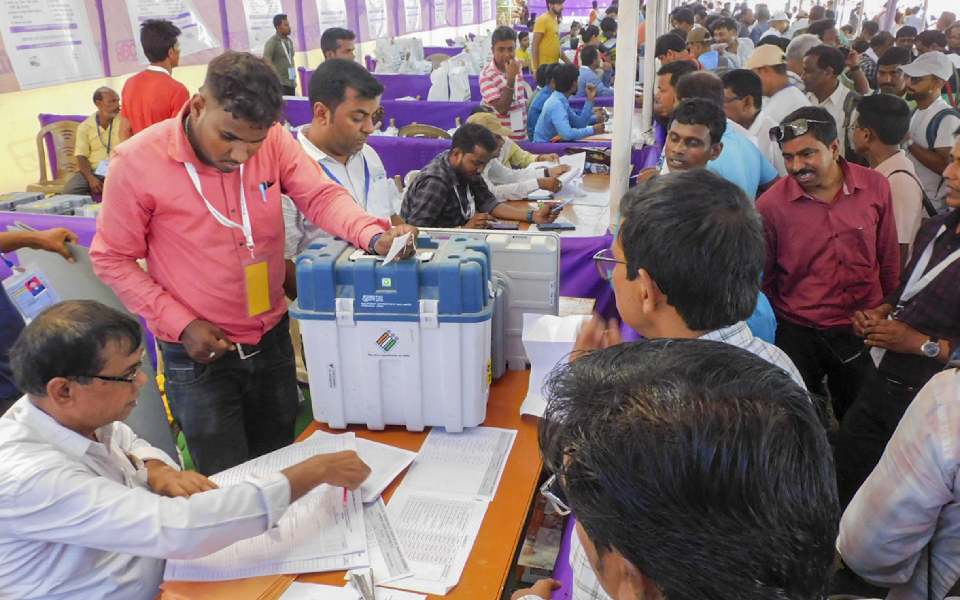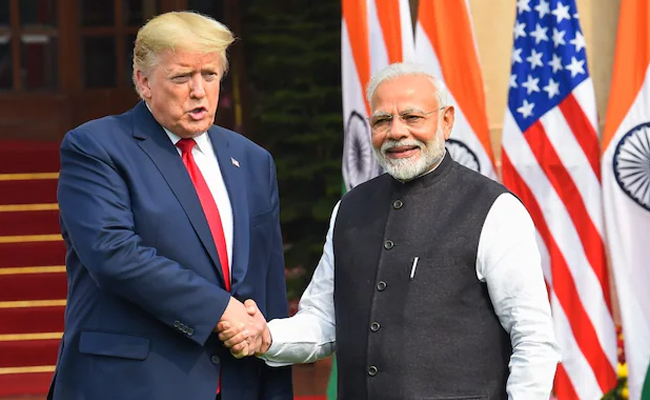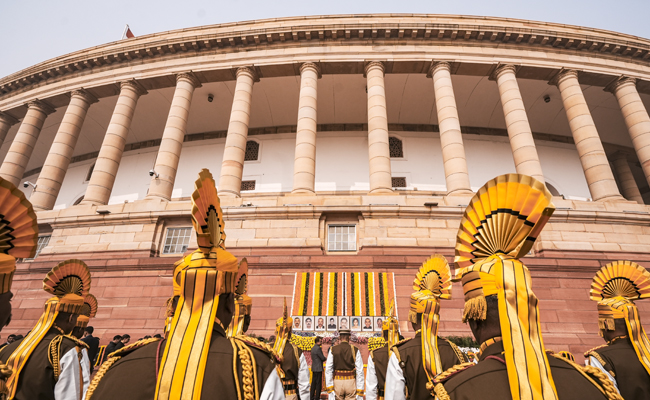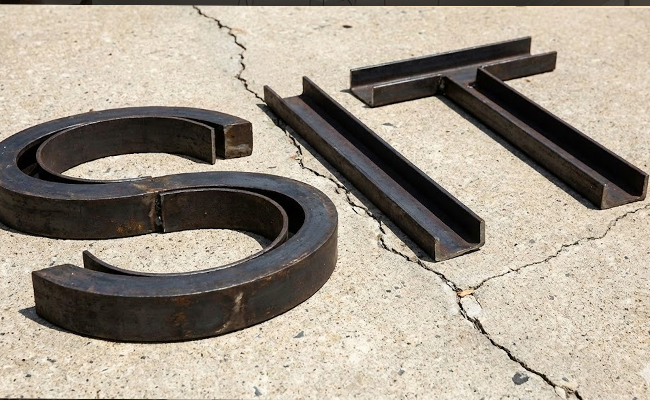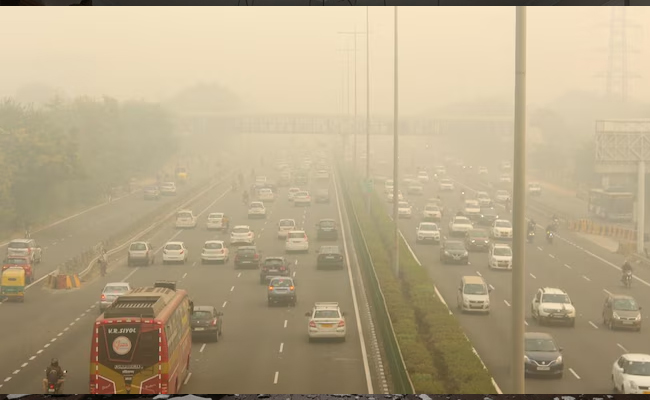New Delhi, May 25: Voting commenced for 58 constituencies in six states and two Union territories, including all the seven seats in Delhi, in the sixth phase of the Lok Sabha elections on Saturday.
Besides the national capital, polling is underway in 14 constituencies in Uttar Pradesh, all 10 seats in Haryana, eight seats each in Bihar and West Bengal, six seats in Odisha, four seats in Jharkhand and one seat in Jammu and Kashmir.
Simultaneously, polling is being held for 42 assembly constituencies in Odisha and the Karnal assembly bypoll in Haryana.
Voting began at 7 am and people were seen queuing up at polling stations.
Prime Minister Narendra Modi took to X to urge voters to exercise their right to franchise in the penultimate phase of the Lok Sabha elections in large numbers.
"I urge all those who are voting in the 6th phase of the 2024 Lok Sabha elections to vote in large numbers. Every vote counts, make yours count too! Democracy thrives when its people are engaged and active in the electoral process. I especially urge women voters and youth voters to vote in large numbers," he said.
Over 11.13 crore voters -- 5.84 crore male, 5.29 crore female and 5,120 third gender -- are eligible to exercise their franchise. The Election Commission (EC) has deployed around 11.4 lakh polling officials at 1.14 lakh polling stations.
With large parts of India sweltering under a heatwave, the EC has directed election officials and state machineries to take adequate measures to manage the adverse impact of hot weather.
Among the prominent candidates in the fray in this phase are Union ministers Dharmendra Pradhan, Rao Inderjit Singh and Krishan Pal Gurjar, BJP's Maneka Gandhi, Sambit Patra, Manohar Lal Khattar and Manoj Tiwari, PDP chief Mehbooba Mufti and Congress' Deepender Singh Hooda, Raj Babbar and Kanhaiya Kumar.
In West Bengal, voting will be held in the tribal belt Jangal Mahal region, spanning five districts. A hotspot for identity politics, the region sends eight representatives to Lok Sabha from Tamluk, Kanthi, Ghatal, Jhargram, Medinipur, Purulia, Bankura, and Bishnupur seats. Out of the eight seats, the BJP won five and TMC bagged three in the 2019 polls.
An interesting fight is on the cards in Delhi with the BJP and the INDIA bloc partners pitted in a direct, one-on-one contest in all the seven seats.
This is the first time the AAP and the Congress have fielded joint candidates against the BJP. While the AAP is contesting four seats, the Congress has fielded candidates on the remaining three seats.
The seats going to the polls in Uttar Pradesh are Sultanpur, Pratapgarh, Phulpur, Allahabad, Ambedkar Nagar, Shrawasti, Domariyaganj, Basti, Sant Kabir Nagar, Lalganj, Azamgarh, Jaunpur, Machhlishahr and Bhadohi.
From Sultanpur, BJP candidate Maneka Gandhi is seeking her ninth entry into the Lok Sabha. The former Union minister is up against the Samajwadi Party's Ram Bhual Nishad and the Bahujan Samaj Party's (BSP) Uday Raj Verma.
Around 82.16 lakh voters, including 40.09 lakh females, are eligible to exercise their franchise in Giridih, Dhanbad, Ranchi and Jamshedpur constituencies of Jharkhand.
Haryana is witnessing a direct fight between the ruling BJP and the opposition Congress on most seats. Besides Union ministers Inderjit Singh and Krishan Pal Gurjar and former chief minister Khattar, and Congress's Kumari Selja, Deepender Singh Hooda and Raj Babbar are among the candidates.
Chief Minister Nayab Singh Saini is contesting the Karnal byelection.
Saini, who is the sitting Kurukshetra MP, was sworn in as the chief minister on March 12, replacing Khattar. Nine candidates are in the fray for the bypoll which was necessitated by Khattar's resignation as MLA. Also after becoming chief minister, Saini needs to get elected as an MLA within six months.
Twenty candidates including PDP's Mehbooba Mufti and National Conference's Mian Altaf are in the fray from the redrawn Anantnag-Rajouri constituency in Jammu and Kashmir.
Multi-layer security arrangements have been put in place in the constituency spread across 18 assembly segments in Anantnag, Kulgam and Shopian in south Kashmir and Rajouri and Poonch districts south of Pir Panjal.
In Bihar, 86 candidates are in the fray in the eight seats of Valmiki Nagar, Pashchim Champaran, Purbi Champaran, Sheohar, Siwan, Gopalganj, Maharajganj and Vaishali.
Polling is being held in six parliamentary constituencies of Bhubaneswar, Cuttack, Dhenkanal, Keonjhar, Puri and Sambalpur along with 42 assembly seats under these Lok Sabha segments.
Let the Truth be known. If you read VB and like VB, please be a VB Supporter and Help us deliver the Truth to one and all.
New Delh (PTI) The Congress on Saturday said it is perhaps not very surprising that India is not part of a US-led strategic initiative to build a secure silicon supply chain, given the "sharp downturn" in the Trump-Modi ties, and asserted that it would have been to "our advantage if we had been part of this group".
Congress general secretary in charge of communications Jairam Ramesh took a swipe at Prime Minister Narendra Modi, saying the news of India not being part of the group comes after the PM had enthusiastically posted on social media about a telephone call with his "once-upon-a-time good friend and a recipient of many hugs in Ahmedabad, Houston, and Washington DC".
In a lengthy post on X, Ramesh said, "According to some news reports, the US has excluded India from a nine-nation initiative it has launched to reduce Chinese control on high-tech supply chains. The agreement is called Pax Silica, clearly as a counter to Pax Sinica. The nations included (for the moment at least) are the US, Japan, the Republic of Korea, Singapore, the Netherlands, the United Kingdom, Israel, the United Arab Emirates, and Australia."
"Given the sharp downturn in the Trump-Modi ties since May 10th, 2025, it is perhaps not very surprising that India has not been included. Undoubtedly, it would have been to our advantage if we had been part of this group."
"This news comes a day after the PM had enthusiastically posted on his telephone call with his once-upon-a-time good friend and a recipient of many hugs in Ahmedabad, Houston, and Washington DC," the Congress leader asserted.
The new US-led strategic initiative, rooted in deep cooperation with trusted allies, has been launched to build a secure and innovation-driven silicon supply chain.
According to the US State Department, the initiative called 'Pax Silica' aims to reduce coercive dependencies, protect the materials and capabilities foundational to artificial intelligence (AI), and ensure aligned nations can develop and deploy transformative technologies at scale.
The initiative includes Japan, South Korea, Singapore, the Netherlands, the United Kingdom, Israel, the United Arab Emirates, and Australia. With the exception of India, all other QUAD countries -- Japan, Australia and the US -- are part of the new initiative.
New Delhi will host the India-AI Impact Summit 2026 on February 19-20, focusing on the principles of 'People, Planet, and Progress'. The summit, announced by Prime Minister Narendra Modi at the France AI Action Summit, will be the first-ever global AI summit hosted in the Global South.
Prime Minister Modi and US President Trump on Thursday discussed ways to sustain momentum in the bilateral economic partnership in a phone conversation amid signs of the two sides inching closer to firming up a much-awaited trade deal.
The phone call between the two leaders came on a day Indian and American negotiators concluded two-day talks on the proposed bilateral trade agreement that is expected to provide relief to India from the Trump administration's whopping 50 per cent tariffs on Indian goods.
In a social media post, Modi had described the conversation as "warm and engaging".
"We reviewed the progress in our bilateral relations and discussed regional and international developments. India and the US will continue to work together for global peace, stability and prosperity," Modi had said without making any reference to trade ties.

